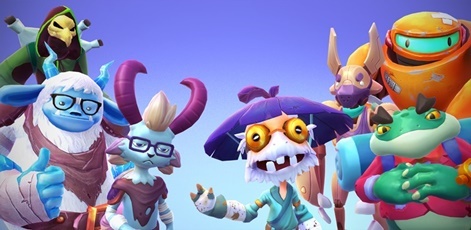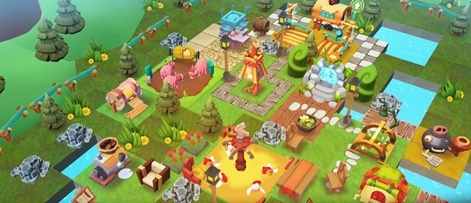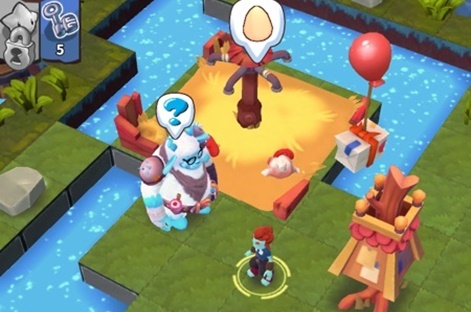This article is the first in a series of regular features from the Elite Game Developers Podcast, which is run by Next Games co-founder and board member Joakim Achrén.
In this article, Achrén speaks with Dazzle Rocks co-founder and CEO Stella Wang about how she got her company started and what advice she has for others. You can listen to the podcast here.
The co-founders, Stella Wang and Joonas Jokela of Dazzle Rocks have always had a passion for innovation and entrepreneurship in their blood.
They first met in 2009 in Stockholm and saw the opportunity of the App Store changing this industry. Thus, they started a consulting company with a focus on digital media strategy.
While talking to clients in various conferences, the founders met Rovio at Assembly Finland, which was intrigued with Wang and Jokela’s forward vision and entrepreneurial spirit. They were invited both to lead the R&D department to shape the first mobile game entertainment brand in the market.
During their time at Rovio, they broke many boundaries and led the never-before-done concepts to market. They even had a nickname in the company of “the SWAT team” since they never left any project incomplete.
After 2013 Jokela left Rovio, but soon showed a prototype for a game to Wang. This lit an immediate spark in the entrepreneurs’ hearts, and so they took their learnings from Rovio and each other with them and decided to co-found the company Dazzle Rocks.
The founding of Dazzle Rocks
Their vision was to build casual social games for both Eastern and Western markets with a unique IP story.
They built several prototypes to verify ideas and they wanted to find something that was unique to the market, something that hadn’t been successfully done or seen before.
With a clear vision in mind, making decisions on their future path was clearer. However, they had to limit their scope, at least initially, since they had a small team and had to focus on one game at a time, and only then build up the portfolio slowly.
Currently, they are working on a casual, non-combat, social MMO game which is an immensely ambitious project.
Wang emphasises that they are gunning to become a games company that builds a portfolio of games focusing on the social experience for multiple players.
Through their portfolio, they will reveal the story of their IP and continue to engage players and the community. They continue to prototype and innovate the game experience since they want to bring new experiences for their players.

The founders take an analytical approach to decision-making by considering both the East and the West in their search for a 'blue ocean' opportunity in the market.
They place particular importance on analysing the changes and growth in the mobile games market and pride themselves for bringing familiar gameplay, yet they innovate to bring it to the next Social MMO revolution.
Building the company
Dazzle Rocks currently has 15 team members. Although the start-up life isn't always a walk in the park, with its tough times and challenges to solve, the team has been nurtured into a familial spirit.
The co-founders take their time to make sure team members have the space to take initiative and grow. Many people like to have creative freedom but not many are accustomed to rapid changes and being solution-oriented.
Dazzle Rocks values people who take the team goal as a priority and are able to wear several hats, as well as reach the finish line with the team. This 'several hats' method is what they coin as the T-shape model. With this model, an employee may have deep knowledge in a specific area, but can and is willing to grow their expertise in other areas as well.
Dazzle Rocks values people who take the team goal as a priority and are able to wear several hats.
This method of learning is important for small start-ups that shouldn't have just monotonously specialised people, but rather have people who can do whatever is needed and will make things happen. This creates a strong company culture and a growth mindset.
Although they have the T-shape model and a strong company culture, they recognise that with building a company from the ground up, there is a continuous battle of keeping ambition and morale high and sticking to deadlines.
The Dazzle Rocks approach to hiring and ways of working
Early on they tried to define who were the best kind of people for a start-up. For some, it means impressive resumes with experience, but Dazzle Rocks felt differently.
They saw that the best people for them were the ones willing to learn more and be passionate about making something special. They wouldn’t be deterred by challenges but rather face them head-on, especially in the young and fast-paced mobile games industry.
Hence they hired a diverse pool of people with one common denominator; they showed potential to grow in the T-shape.
The majority of the 15-person team has been with Dazzle Rocks for over three years. Wang believes that they have managed to create an environment where everyone gets the chance to grow and take on more responsibility through different kinds of tasks. The founders’ goal is to give them all the opportunity to become the future leaders of the team.

At Dazzle Rocks, the team doesn’t really wear titles; the focus is on what is to be achieved and what KPI goals they want to reach.
They accomplish these goals with feature teams where they take certain parts of the game and let it be developed by a smaller team. This team gets the creative freedom to finalise the design of the feature and work through solutions to get it delivered to the players. This results in a workflow that allows everyone to get heard and develop their skills.
If the team feels uncomfortable about a task that is new and challenging or they just have a question, Wang and Jokela’s approach is to always offer help from the founders' side. That’s how people find the balance of comfort and responsibility, and they learn and grow.
When they hire people they also make sure to involve the rest of the staff and let them share the culture and explain how the team works at Dazzle Rocks. It’s important that the culture and personal chemistry are aligned. Wang also believes people will continue to openly share their feedback and opinions when the studio grows bigger.
Planning the future
Making decisions based on the plan and the future
Dazzle Rocks' focus is threefold. First, it follows the blue ocean strategy by finding growth trends in the market, taking an existing game and innovating it to further the players’ experience.
When Jokela and Wang started the company they did plenty of research on successful games companies and their backers.
Second, it's metrics-focused. It looks at player funnels and iterates based on the funnel. Third, the team tests their product. They do player testing to verify their design and impact with actual player experiences.
Pitching to investors and picking the right investors to talk to
When Jokela and Wang started the company they did plenty of research on successful games companies and their backers.
Crunchbase was highly utilised, looking at how companies raised money, at what stage and who backed them at what stage. Not only that, but they looked at successful companies’ visions and what made them stand out in the crowded space.
They took these learnings and iterated their pitch decks again and again. They took the rejected meetings as a step forward to think deeper and prepare better for the next pitch.
Wang specifically mentions one of the best parts of pitching is that it challenged her to revisit their strategy, games and teams each time.
“You might get 100 rejections from investors but you need just one to believe in you," she said.
When they started they had a couple of investors in mind that they wanted on board to help in the early stages. They got Initial Capital and Sisu to invest in them.
Building the best relationships with their investors
Wang tends to see investors as being on the same side of the table with them. It is important that founders can share all the ups and downs with their investors. Good investors have seen it all, they always have advice for founders during crossroads.

Wang is straightforward. She tells it how it is and does not fear telling the bad news when necessary. That may be a reason why she has been successful in getting investors on her side. The key word here might be expectation management, where it makes sense to highlight the risks that the founder is dealing with.
What is the right time for a games company to raise a big investment round?
Wang takes some time to think about this one as it is a tough question. Every company has a different DNA. Some are more focused on the senior teams, some on the unique game ideas and successfully raising at the right time with the right vision.
Wang notes a lesson she learned early on is that if the start-up needs money, and only then you start talking to a VC, it's too late.
Compared to 2012, Wang sees some changes in the investment landscape. Currently, investors want more metrics. However she still believes that with the right vision a company can always find the right type of investors to invest early.
Spending time with new investors versus existing investors
Wang notes a lesson she learned early on is that if the start-up needs money, and only then you start talking to a VC, it's too late. She tries to always meet new investors at conferences so that she will have a relationship ready, especially if they show interest in investing in the future.
Even if there is an interest Wang sometimes states in an honest matter that it's too early for that investment and instead just shows the progress they have made. It is also important to learn the investor's investment strategy and hear their feedback. She points out that most want to see the growth progress of the start-up.
With Dazzle Rocks’ early-stage investor, Wang kept the manner of updates casual and frequent. They have recently closed new rounds with new investors. They have now started with more frequent board meetings with clear agendas.
The current mobile games market
Wang notes that the current mobile games market is crowded and competitive. However, she is optimistic since there is always a space that people have yet to discover.
Take Fortnite for example. That is showing us that social interactions in games are just getting started. Wang believes that this casual social gaming space is just going to grow and stresses the importance of looking at market trends, what is hot, but also looking at the areas that are not filled yet.
This is the starting point when Dazzle Rocks thinks about the games they want to do.
You can find out more about the Dazzle Rocks team here.
You can find the full podcast interview with Stella Wang at:























